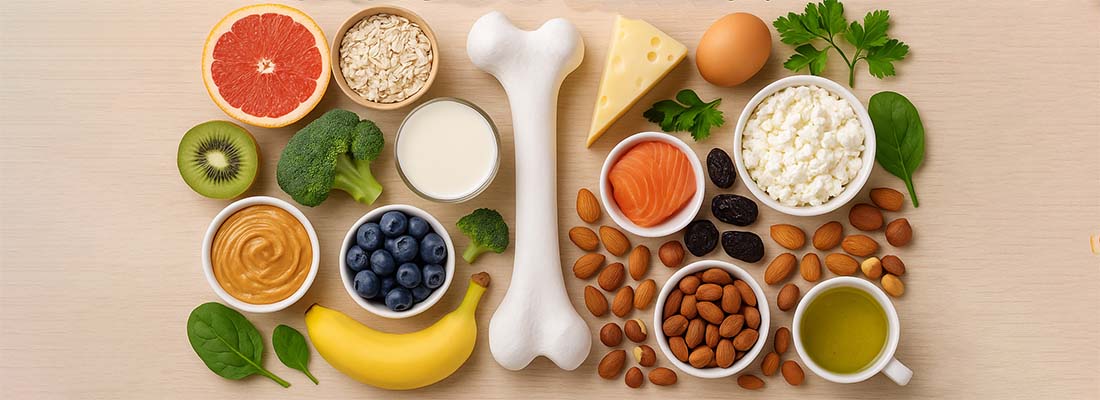للحفاظ على عظام قوية وصحية وتطويرها، من الضروري اتباع نظام غذائي متوازن ومغذٍ في كل مرحلة من مراحل الحياة. ورغم أن صحة العظام تصبح أكثر أهمية مع التقدّم في السن أو عند انقطاع الطمث لدى النساء، فإن أي عامل يقلل من كثافة العظام قد يؤدي إلى هشاشة العظام.
ولمواجهة هشاشة العظام، يوصي الأطباء عادةً بإجراء تعديلات غذائية وتغييرات في نمط الحياة. ومن الأسئلة الشائعة لدى المصابين: ما الأطعمة المفيدة لهشاشة العظام، وأيها يجب تجنبه؟
إن تناول الأطعمة الغنية بالكالسيوم، فيتامين D، البروتين، المغنيسيوم وفيتامين K – مع تجنب الأطعمة المالحة، الكافيين المفرط، منتجات القمح عالية النخالة، الكحول وغيرها – يُعدّ أساسياً لتقوية العظام والحفاظ عليها من أجل مقاومة هشاشة العظام.
ما الأطعمة المفيدة لصحة وقوة العظام؟
يساعد اتباع نظام غذائي صحي منذ سن مبكرة على بناء عظام قوية والحفاظ عليها مدى الحياة.
ضعف صحة العظام يزيد من خطر الإصابة بأمراض مثل الكساح وهشاشة العظام، ويرفع احتمالية حدوث الكسور في الشيخوخة حتى مع الإصابات البسيطة.
من أبرز الفيتامينات والمعادن الأساسية لصحة العظام:
الكالسيوم
يلعب دوراً محورياً في تقوية العظام. يحتاج البالغون إلى نحو 700 ملغ يومياً.
من مصادره: الحليب، الجبن، منتجات الألبان، الخضروات الورقية مثل البروكلي، الصويا ومشروباته، المكسرات، الخبز المصنوع من دقيق مدعّم، والأسماك.
فيتامين D
ضروري لصحة العظام. يحتاج البالغون إلى نحو 10 ميكروغرام يومياً، يمكن الحصول على جزء منها عبر التعرض للشمس.
من مصادره: الأسماك الدهنية (مثل السردين)، صفار البيض، والحبوب المدعمة. يُوصى بالمكملات لمن يتجنّبون الشمس، النباتيين وكبار السن.
البروتين
يشكّل جزءاً كبيراً من بنية العظام. من مصادره: منتجات الألبان، الأسماك، الدجاج، البقوليات، الحبوب الكاملة، المكسرات، البذور، الذرة، البروكلي والهليون.
المغنيسيوم
ضروري لقوة العظام. يحتاج البالغون إلى 250–400 ملغ يومياً. من مصادره: التفاح، الموز، التين المجفف، المشمش المجفف، الزبيب والأفوكادو.
فيتامين K خاصة (K2)
مهم جداً لكثافة العظام. الجرعة الموصى بها: 45–180 ميكروغرام يومياً. من مصادره: البقدونس، الكرنب، الخس، الشاي الأخضر، اللفت، الهليون، الكرفس وصفار البيض.
فيتامين C
مضاد أكسدة قوي يحمي من تدهور العظام. مصادره: الحمضيات، التوت، الفلفل، البروكلي.
الزنك
يلعب دوراً رئيسياً في تجديد العظام والحفاظ على بنيتها. من مصادره: المأكولات البحرية، الدجاج، العدس والمكسرات.
- الأطعمة الضارة بصحة العظام (تزيد خطر هشاشة العظام)
- الأطعمة المالحة: الصوديوم المرتفع يسبب فقدان الكالسيوم من الجسم.
- نخالة القمح: غنية بالفيتات التي تعيق امتصاص الكالسيوم.
- الكحول: يسبب فقدان الكتلة العظمية.
- المشروبات المحتوية على الكافيين: مثل القهوة، الشاي والمشروبات الغازية، تقلل امتصاص الكالسيوم.
- الإفراط في السكر: يؤدي إلى فقدان الكالسيوم والمغنيسيوم والبوتاسيوم عبر البول، ويخفض مستويات فيتامين D.
- الأطعمة الغنية بالأوكسالات والفيتات: مثل السبانخ، الراوند، بعض الحبوب والبقوليات.
أطعمة مفيدة لهشاشة العظام
- الخضروات الورقية الداكنة: مثل الكرنب، البروكلي، واللفت.
- البطاطا المشوية (بدون ملح): غنية بالبوتاسيوم والمغنيسيوم.
- الأسماك الدهنية: مثل السلمون والتونة، لاحتوائها على فيتامين D وأوميغا-3.
- زبدة الفول السوداني: ملعقتان كبيرتان تحتويان على 111 ملغ كالسيوم.
- الحليب النباتي المدعّم: مثل حليب الصويا، اللوز وجوز الهند.
- الخوخ المجفف (البرقوق): يبطئ فقدان العظام ويحسن الكثافة.
- منتجات الألبان: خاصة المدعّمة بفيتامين D.
- الشاي الأخضر: غني بمضادات الأكسدة.
- المكسرات: غنية بالكالسيوم والمغنيسيوم والفوسفور.
- البيض: مصدر لفيتامين D يساعد على امتصاص الكالسيوم والفوسفات.
الفواكه المقوية للعظام
- الجريب فروت: غني بفيتامين C.
- التين: 5 حبات تعطي نحو 90 ملغ كالسيوم.
- الموز: غني بالبوتاسيوم والمغنيسيوم.
- الكيوي: يحتوي على الكالسيوم والمغنيسيوم والفيتامينات C وA وK.
الأسئلة الشائعة
هل يمكن شفاء هشاشة العظام نهائياً؟
لا يمكن علاج هشاشة العظام بشكل كامل، لكن يمكن السيطرة عليها بالأدوية، النظام الغذائي والتغييرات في نمط الحياة.
ما الذي يزيد من خطر الإصابة بهشاشة العظام؟
الإفراط في تناول الكحول، المشروبات الغنية بالكافيين، الأطعمة المالحة، والخيارات الغذائية غير الصحية يضعف العظام بمرور الوقت ويزيد خطر هشاشتها.


